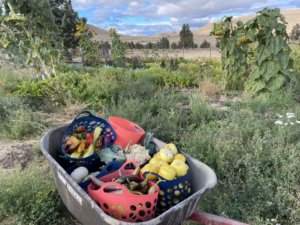Organic Producers Lead the Nation in Soil Health Practices
Organic production starts with healthy soils which regulate water, sustain plant and animal life, filter and buffer potential pollutants, manage nutrients, and provide physical structure to support strong plant roots. According to the 2022 National Organic Research Agenda (NORA), organic producers lead the nation in adoption of soil health and environmental stewardship practices. Such practices include cover cropping, crop rotations, and perennial conservation plantings.
Cover crop plants include legumes (such as clover, vetch, peas, and beans) and non-legumes (including cereals, grasses, and broadleaf species). Approximately 76% of organic field crop farmers plant cover crops regularly; in contrast, only 10% of conventional field crop farmers follow this soil-building practice.
The National Organic Program (NOP) defines crop rotation as “the practice of alternating the annual crops a grown on a specific field in a planned pattern or sequence.” Approximately 63% of 2022 NORA respondents reported using crop rotations very often. Among transitioning to organic farmers, three-quarters of respondents participate very often in crop rotations. In addition, 83% of transitioning farmers reported using soil-building intercropping practices as well.
To conserve biodiversity, organic producers also implement perennial conservation plantings. Nearly three-quarters of 2022 NORA survey respondents reported maintaining some of their certified land in one or more of the following:
- buffer strips and border rows
- hedgerows, windbreaks or shelter belts
- wildflower strips
- other plantings such as woodland, prairie, or natural areas.
Perennial conservation plantings promote beneficial and pollinator habitat, reduce the wind and water erosion, intercept runoff and pesticide drift, and enhance soil health and sequesters carbon within the area covered by perennial vegetation.
One National Organic Research Agenda respondent stated, “Soil is very important, and it is the building block of everything else. And if you treat it poorly, it will pay you poorly for years to come. If you treat it well, it will serve you well. You have to be constantly vigilant on your soil, and it is pretty darn important.”
Soil health and organic farming guide books are available online to help beginning farmers implement practices such as cover cropping and also provide additional information for more experienced producers.




 Tell us about yourself.
Tell us about yourself. Organic agriculture is important to me because it protects people and the planet. I personally don’t agree with agricultural systems that depend upon toxic pesticides to grow food. Food is meant to nourish us, not make workers and consumers sick or poison natural ecosystems. Organic research is especially important because we must also learn to meet the growing demand for organic foods and growing pest pressure.
Organic agriculture is important to me because it protects people and the planet. I personally don’t agree with agricultural systems that depend upon toxic pesticides to grow food. Food is meant to nourish us, not make workers and consumers sick or poison natural ecosystems. Organic research is especially important because we must also learn to meet the growing demand for organic foods and growing pest pressure. Who is your farming, research and/or food hero – and why?
Who is your farming, research and/or food hero – and why?